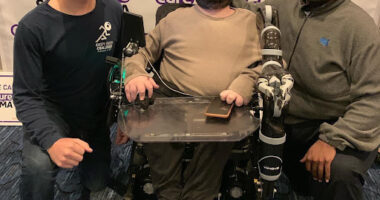
Hugo Trevino: Finding good SMA healthcare
Hugo Trevino, who has SMA type 3, shares the red and green flags to look for when seeking healthcare providers for people with SMA.
 Find a specialist near you
Find a specialist near you
Transcript
People can go to the MDA.org website, and they do have like a list of providers or MDA care clinics. And usually those would be your best bets because they are gonna have neurologists there that do specialize in rare neurological disorders.
But if there isn’t one in your area and you don’t want to drive more than 2 miles away from your house — which I know that that can also be, you know, taxing, especially for us with disabilities and having to sit in cars. (I don’t know about y’all, but my feet get swollen, things like that, when I’m like sitting in the, you know, just in a car ride for too long.) And so what I would recommend is definitely talk to your primary care doctor. You’ll always need a referral from them in order to be able to see a neurologist or a specialist.
And then once you do get an appointment with a neurologist, make sure that you do ask that question: “Hey, can I speak to a neurologist that knows about rare neurological diseases?” You know, and then make sure that you state what your diagnosis is.
If you don’t know what your diagnosis is and you’re trying to kind of get, you know, that DNA testing — especially now people with SMA, I know some of us got diagnosed when we were younger and you know, they might’ve just been like, “Yes, you have SMA,” and especially now with all the treatments out there, I had to get retested as well for my SMA so I knew how many SMA copies I had, things like that — make sure that you also let the neurologist or whatever specialist that you’re gonna be seeing know about the fact that you’re also interested in genetic testing for spinal muscular atrophy. And if they are also — if they know about that.
Another clear sign, I remember when I was looking for a primary care doctor, I did see a doctor, I told her all about my disability. I think we had a follow-up appointment. When we did my follow-up appointment, they once again asked me about my disability and my diagnosis and to explain it again.
And in my mind, I was like, “Oh, that’s a red flag. Like, why didn’t they research my disability? Why don’t they know more about it? Why am I still having to educate them?” So that could be a red flag too for people out there, if your doctor is not taking the time to learn what spinal muscular atrophy is — to contact other colleagues, to contact people who they want to school with, right, that maybe are in that field of rare neuromuscular diseases — then maybe you should switch doctors, right?
And so hopefully — you know, bigger hospitals, you know, in bigger cities will always be the best bet — but hopefully that’s one way that people can work around that issue.
Recent Posts








